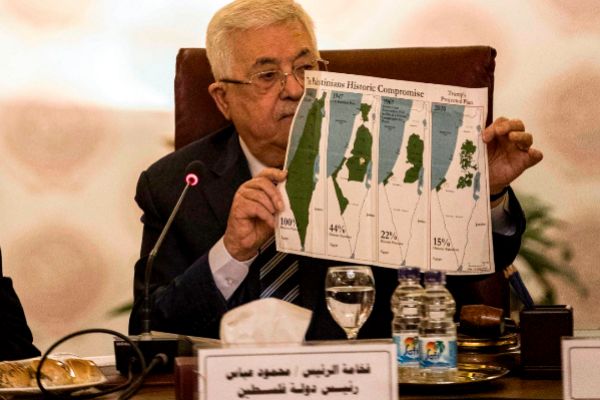- Conflict.Donald Trump presents his peace plan: "All parties win"
- Reaction: The response of the Palestinians to the peace plan of Donald Trump: "A thousand times no"
Days after the Arab countries received with condescension and even support the peace plan presented by Donald Trump, the Arab League on Saturday closed the door to any possibility of agreement. During the extraordinary meeting in Cairo, Palestinian President Mahmoud Abbas has announced the breaking of all ties with Tel Aviv and Washington, including security cooperation.
The pan-Arab organization has shown "its rejection of the US-Israeli century agreement by considering that it does not meet the minimum rights or aspirations of the Palestinian people." "We will not cooperate with the US administration in the implementation of this plan," underlines the final resolution, which supports the resounding refusal shown by the Palestinians to what they have described as "the slap of the century . "
The Arab League insists that Trump's proposal, in which Jerusalem is recognized as the united capital of Israel and is granted to Tel Aviv the annexation of all its settlements, ignores the legal references that until now had supported the process of peace. The agency and its 22 member countries reaffirm their commitment to the solution of the two states that includes the creation of a Palestinian state according to the pre-war borders of the six days of 1967 and with East Jerusalem as its capital.
The statement, published after the extraordinary meeting of the foreign ministers of the member countries at its headquarters in the Egyptian capital, also condemns any attempt by Israel to act unilaterally in reference to its immediate aspiration to accelerate the annexation of parts of the West Bank. "Israel will be solely responsible for the consequences of such policies," warns the Arab League, which urges the international community to stop its ambitions.
The secretary general of the organization, the Egyptian Ahmed Abul Gheit, has censored that the historic change of US position "does not help to achieve peace or find a solution" to the conflict . The diplomat has asked, instead, that both parties in liza negotiate "a satisfactory solution for both" outside the agreement designed by Trump, unacceptable to the Palestinians because it formalizes the unification of Jerusalem as Israel's only capital and the annexation of almost a third of the West Bank, and makes a future Palestinian State unfeasible because of its fragmentation.
"Sell Jerusalem"
In the course of the meeting, Abbas has advanced that takes relations with Israel and the United States as broken. "I am not going to record (my name) in my history and in that of my country as who sold Jerusalem, because Jerusalem is not mine but of all," he has argued before the audience. Washington's plan only grants the Palestinians the area of Abu Dis, in East Jerusalem, and a state whose territory would only represent 22% of the "historic Palestine."
The Palestinian leader has taken advantage of the session to move forward that breaks any relationship with the US and Israel, including in the field of cooperation, and has refused to receive a copy of the peace proposal and answer a Trump phone call. "If they did, I knew they would use it to say they had consulted us," he has slipped. "I will never accept this solution," he stressed.
Abas has been willing to propose an alternative agreement to the UN Security Council. "We still believe in peace using the Arab peace initiative and the resolutions of the UN Security Council as a basis," he added.
The meeting of the Arab League, a famous body for its untimely and long sessions and its resolutions of little or no use, has cleared the doubts that had drawn the reactions to the plan of some countries. Egypt, for example, urged "consider the initiative of the US administration." According to the independent newspaper MadaMasr , the Egyptian Presidency removed from the draft communiqué the reference to the pre-1967 borders and the maxim that "it would be impossible to achieve peace without restoring Palestinian rights."
Other countries also released signs of their acceptance of the plan. The ambassadors of Oman, Bahrain and the United Arab Emirates in Washington were present at the event in which Trump made the proposal public. The Republican mentioned them and thanked "the incredible work" that had been his help.
Saudi Arabia, on the other hand, thanked Trump's "efforts" but avoided any support for the White House road map and reiterated that the negotiations should lead to "an agreement that meets the legitimate rights of the Palestinian people." And Jordan, with the Palestinian conflict turned into an internal matter and being the only Arab country next to Egypt that has signed a peace agreement with Israel, rejected the baptized as "agreement of the centuries" and promised to work on a pact that allows "a lasting peace that satisfies the legitimate rights of the Palestinian people."
According to the criteria of The Trust Project
Know more- Israel
- Egypt
- Donald Trump
- Palestine
- Jordan
- U.S
- Saudi Arabia
Middle East Palestinian Indignation at the "slap of the century"
The keys to a peace agreement full of contradictions
Death of Soleimani Israel fears retaliation after the death of its great enemy

